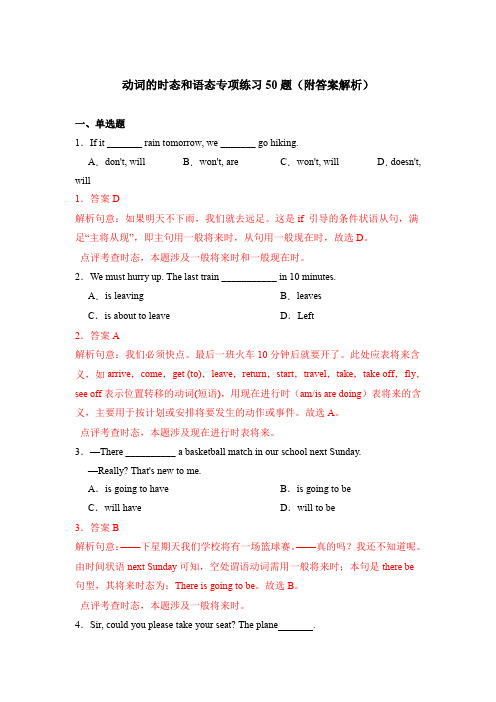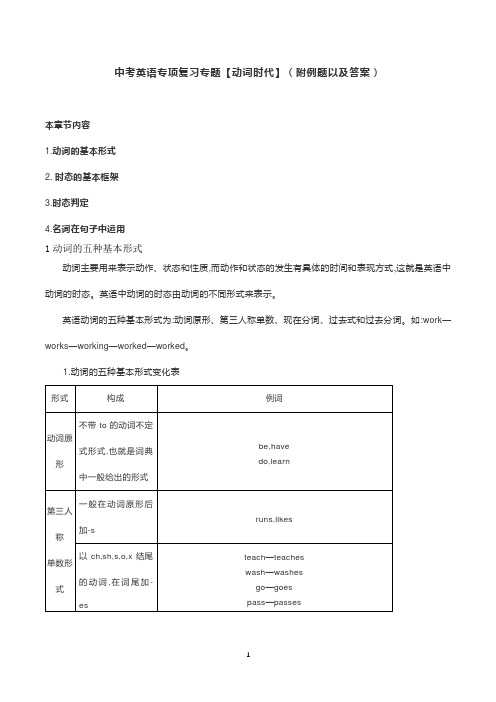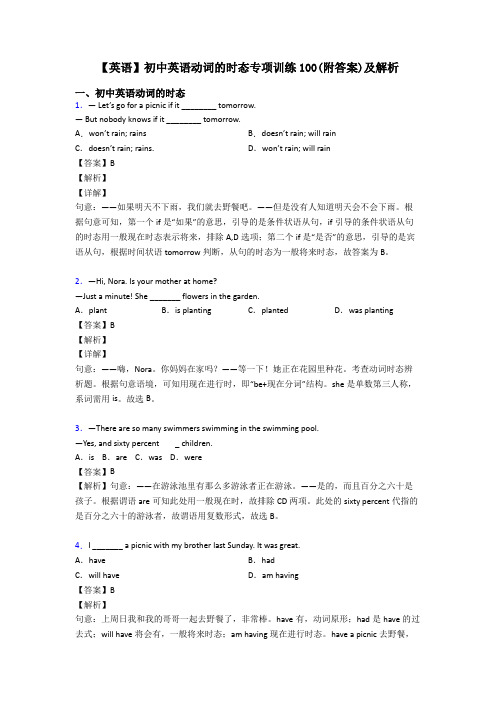初中英语动词时态专题
初中英语语法专项8动词的时态和语态

【中考考点】
(1)动词的第三人称单数形式、过去式、过去分词和现在分词的构成。 (2)动词的八种时态的基本结构及用法。 (3)动词的被动语态的基本结构及用法。 (4)动词的主动形式表示被动意义的用法。
动词的时态
考点一 一般现在时
1.结构 一般现在时主要用动词原形表示(当主语是第三人称单数时,谓语动词用第三人称单数形式)。 2.动词的第三人称单数形式变化规则 (1)直接加-s。如:work—works (2)以“辅音字母+y”结尾的词,先变y为i,再加-es。如:carry—carries, cry—cries, try—tries, study—studies (3)以s, x, o, ch, sh结尾的词加-es。如: pass—passes, fix—fixes, go—goes, do—does, teach—teaches, wash—washes (4)特殊:have—has, are—is
动词的时态
考点四 过去将来时
1.结构 would+动词原形 was/were+going to+动词原形 2.用法 表示从过去的某一时刻看,将要发生的动作。 His uncle said that there would be a good harvest the next year.他叔叔说第二年会有一个 好收成。 【注意】 在由if引导的条件状语从句中,如果主句用过去将来时,那么if从句需用一般过去时代替过 去将来时。 If he were here, he would show us how to do it. 如果他在这儿,他就会向我们展示该如何做。
动词的时态
4.动词过去式的变化规则 (1)一般情况下,在动词原形后加-ed。如: watch—watched (2)以不发音的字母e结尾的加-d。如:live—lived (3)以“辅音字母+y”结尾的,变y为i,再加-ed。如: study—studied, carry—carried, cry—cried (4)以重读闭音节结尾,且末尾只有一个辅音字母的,先双写该辅音字母,再加-ed。如: stop—stopped, plan—planned, prefer—preferred (5)不规则动词的过去式需特殊记忆。
初中英语动词的时态和语态专项练习50题(附答案解析)

动词的时态和语态专项练习50题(附答案解析)一、单选题1.If it _______ rain tomorrow, we _______ go hiking.A.don't, will B.won't, are C.won't, will D.doesn't, will1.答案D解析句意:如果明天不下雨,我们就去远足。
这是if 引导的条件状语从句,满足“主将从现”,即主句用一般将来时,从句用一般现在时,故选D。
点评考查时态,本题涉及一般将来时和一般现在时。
2.We must hurry up. The last train ___________ in 10 minutes.A.is leaving B.leavesC.is about to leave D.Left2.答案A解析句意:我们必须快点。
最后一班火车10分钟后就要开了。
此处应表将来含义,如arrive,come,get (to),leave,return,start,travel,take,take off,fly,see off表示位置转移的动词(),用现在进行时(am/is are doing)表将来的含义,主要用于按计划或安排将要发生的动作或事件。
故选A。
点评考查时态,本题涉及现在进行时表将来。
3.—There __________ a basketball match in our school next Sunday.—Really? That's new to me.A.is going to have B.is going to beC.will have D.will to be3.答案B解析句意:——下星期天我们学校将有一场篮球赛。
——真的吗?我还不知道呢。
由时间状语next Sunday可知,空处谓语动词需用一般将来时;本句是there be句型,其将来时态为:There is going to be。
【英语】中考英语动词的时态专题(word)

【英语】中考英语动词的时态专题(word)一、初中英语动词的时态1.They don’t live here any longer. They to Chengdu last month.A.move B.moved C.will move D.are moving【答案】B【解析】【详解】句意:他们不再住在这里了,他们上个月搬到了成都。
考查一般过去时。
A. move一般现在时;B. moved一般过去时;C. will move一般将来时;D. are moving现在进行时。
根据They don’t live here any longer.可知此处句意为“他们上个月搬到了成都。
”由last month可知时态用一般过去时;故答案选B。
2.I think I _ my new project tomorrow.A.start B.started C.will start D.was starting【答案】C【解析】句意:我想我明天将要开始我的新项目。
本题考查动词的时态。
A. start 开始,是动词原形 B. started 开始,是动词的过去式 C. will start 将要开始,是动词的将来时 D. was starting就要开始,是过去将来时。
根据句意选C。
3.We a few museums while we were in London.A.visit B.visitedC.have visited D.are visiting【答案】B【解析】句意:当我在伦敦时,我参观了几个博物馆。
A. visit 参观,用于一般现在时态,主语复数时; B. visited 参观,用于一般过去时态; C. have visited 参观,用于一般现在完成时态;D. are visiting 参观,用于现在进行时态,主语复数时;根据 while we were in London.可知主句用过去时态;故选B4.—Hi, Nora. Is your mother at home?—Just a minute! She _______ flowers in the garden.A.plant B.is planting C.planted D.was planting【答案】B【解析】【详解】句意:——嗨,Nora。
(英语)初中英语动词的时态专题训练答案及解析

(英语)初中英语动词的时态专题训练答案及解析一、初中英语动词的时态1.Jack ______ a shower when his mother rang him up.A.takesB.has takenC.is takingD.was taking【答案】D【解析】句意:当他妈妈给他打电话的时候杰克正在洗澡。
本句考查过去进行时态。
“他妈妈打电话”是过去的时间,在过去某个时间正在进行的动作,使用过去进行时,故选D。
2.—My grandma looking at that photo on the wall.—I can understand. It helps her remember her childhood.A.enjoys B.enjoyedC.was enjoying D.will enjoy【答案】A【解析】句意:——我奶奶喜欢看墙上的那个照片。
——我能理解,它能帮她想起她的童年。
A. enjoys喜欢,用于一般现在时态,主语单三时; B. enjoyed 喜欢,用于一般过去时态;C. was enjoying 喜欢,用于过去进行时态,主语单三时;D. will enjoy喜欢,用于一般将来时态;根据It helps her remember her childhood.可知用一般现在时态;故选A3.-Has your cousin arrived in Beijing yet?--Yes. She Beijing since yesterday morning.A.arrived in B.has arrived in C.has been in D.has been to【答案】C【解析】句意:你表弟到北京了吗?-是的。
她从昨天起就在北京了。
since yesterday morning自昨天早晨以来,表示的是截止到目前为止的时间段,用于现在完成时态,排除A;arrived为短暂性动词,不能与表示一段的时间状语连用;have been to表示某人去过某地,也不能与表示一段的时间状语连用,故答案为C。
动词的时态专题练习

动词的时态专题练习一、初中英语动词的时态1.By the time I ________ on the TV, Beckham ________ two goals.A.turned; have scored B.turned; had scoredC.had turned; have scored D.had turned; had scored【答案】B【解析】句意:当我打开电视的时候,贝克汉姆已经进了两个球。
考查动词时态辨析题。
本句是时间状语从句,by the time到…时候为止,用于一般过去时,可排除CD选项。
从句用一般过去时,主句用过去完成时,需用“had+过去分词”结构,可排除A;根据句意结构,可知选B。
2.— Did you sleep well last night?—Far from that! One of my neighbours ▲ music pretty loud.A.plays B.was playing C.is playing D.would play【答案】B【解析】句意:-----你昨晚睡得好吗?------远非如此!我的一个邻居在大声演奏音乐。
A. plays一般现在时态;B. was playing 过去进行时态;C. is playing 现在进行时态; D. would play过去将来时态。
结合语境可知,昨晚睡不好觉的原因是当时有人在演奏音乐,故用过去进行时态来描述,答案为B。
3.My grandparents in that city since they got married.A.will live B.have lived C.live D.were living【答案】B【解析】句意:自从结婚以来,我祖父母就住在那个城市。
since they got married是表示截止到目前为止的时间段,主句要用现在完成时态,故答案为B。
4.He told me that he ________ here for five minutes.A.has comeB.had arrivedC.had beenD.had come【答案】C【解析】句意:他告诉我他到这儿5分钟了。
初中英语动词时态专项练习题(附答案)

初中英语动词时态专项练习题(附答案)一、选择题1. - Where _____ you go for your summer vacation?- I _____ to the beach.A. did / goB. do / goC. will / goD. are / go答案:A2. My brother _____ to the movies last night.A. goesB. is goingC. wentD. go答案:C3. They _____ food if they are hungry.A. will eatB. eatC. eatingD. ate答案:A4. Sarah _____ a birthday party next Saturday.A. hasB. is havingC. haveD. had答案:B5. I _____ Chinese for three years.A. studyB. studiedC. studyingD. have studied 答案:D二、填空题1. My father _____ a doctor in the hospital.答案:is2. ______ you at the park last evening?答案:Were3. She always ______ her homework after school.答案:does4. I _____ my best friend next week.答案:will meet5. They _____ to the zoo last Sunday.答案:went三、改错题1. She go to school by bus every day.答案:go → goes2. They is playing basketball in the gym.答案:is → are3. I am not speak English very well.答案:am not → do not4. Where did you go yesterday night?答案:night → evening5. We have learn English since we were young.答案:learn → learned以上就是初中英语动词时态专项练习题及答案,希望能对你有所帮助。
中考英语专项复习专题【动词时代】(附例题以及答案)

中考英语专项复习专题【动词时代】(附例题以及答案)本章节内容1.动词的基本形式2. 时态的基本框架3.时态判定4.名词在句子中运用1动词的五种基本形式动词主要用来表示动作、状态和性质,而动作和状态的发生有具体的时间和表现方式,这就是英语中动词的时态。
英语中动词的时态由动词的不同形式来表示。
英语动词的五种基本形式为:动词原形、第三人称单数、现在分词、过去式和过去分词。
如:work—works—working—worked—worked。
1.动词的五种基本形式变化表2时态的基本框架常见六种时态的构成及用法(1)一般现在时用法:①现在经常性的状态或动作;②客观事实和真理。
构成:①be+表语;②实义动词作谓语标志词:often, sometimes, usually, always, never,twice a month, every day/week/month/year(every系列)例句:He usually gets to school early.他通常很早到校。
The moon moves around the earth.月亮绕着地球转。
练一练1.认识从实践开始Knowledge practice.2.如果明天下雨,我们就不去公园了。
If it tomorrow,we to the park.【答案】1. begins with.2.rains,won’t go(2)一般过去时用法:表示过去的动作或状态。
构成:①was/were+表语;②实义动词作谓语标志词:a moment ago,just now,ago, yesterday, last night/week/month(last系列)例句:We went to Yunnan last Monday.上周一我们去了云南。
1.She (not visit)her aunt last weekend.2.My friend,Lucy, (study)for the math test and (practice)English last night. 【答案】1.didn’t visit 2.studied practiced(3)一般将来时用法:表示将来的动作或状态。
【英语】初中英语动词的时态专项训练100(附答案)及解析

A.produces,was produced B.was produced,produces
C.produces,produces D.was produced,produced
【答案】A
13.In the past few years, many schools ______ the ways of doing morning exercises.
A.changeB.changesC.will changeD.have changed
【答案】D
【解析】
试题分析:句意:在过去的几年里,很多学校已改变了做早操的方式。根据时间状语In the past few years可知,本题用现在完成时。故选D。
一Yes. Ithere many times.
A.went; have been B.have gone; went
C.went; have gone D.have been;went
【答案】A
【解析】句意:-桂林是个很棒的地方。我多年前去过那里。-是的。我去过那里很多次。many years ago很多年前,跟一般过去时态连用,所以谓语动词使用go的过去式went。下文表示过去的动作对现在造成的影响与结果,所以谓语动词使用现在完成时态,have/has+动词的过去分词,have/has been to.. ,意为“曾经去过某地”,有“去过某地”的经历; have/has gone to…,意为“去了某地”,人不在说话地点。本句表示“曾经去过某地”。故选:A。
5.—Why didn't you open the door for me just now?
- 1、下载文档前请自行甄别文档内容的完整性,平台不提供额外的编辑、内容补充、找答案等附加服务。
- 2、"仅部分预览"的文档,不可在线预览部分如存在完整性等问题,可反馈申请退款(可完整预览的文档不适用该条件!)。
- 3、如文档侵犯您的权益,请联系客服反馈,我们会尽快为您处理(人工客服工作时间:9:00-18:30)。
时态的基本判定方式:一、时间状语同时态的关系:一般情况下,简单句可根据句中的时间状语确定谓语动词的时态。
其判定方式如下:1、句中含有yesterday; last year(last + 具体时间); two days ago(一段时间+ ago); just now; this morning; in 2008(in + 过去的年代); the other day; over the weekend等时间状语时,谓语动词用一般过去时;2、句中含有tomorrow; next week(next +具体时间); in two hours(in +一段时间); (how) soon; from now on; 10 years from now(一段时间+from now); in the future; in 2012(in +将来的年代); by (the end of) next month (by+将来时间); for the weekend; this afternoon; this evening; tonight; this weekend等时间状语时,谓语动词用一般将来时;3、句中既有yesterday等过去时间状语,又有一个具体时间点(at 5:00; this time; at that time)时,谓语动词用过去进行时;4、句中含有recently; in the last/past two years(in the last/past+一段时间); over the years(over the+一段时间); since 2005(since+具体时间或从句); for two years(for+一段时间,句中无其它时间状语); before(单独用于句尾)等时间状语时,谓语动词用现在完成时;5、by (the end of) last year(by+过去时间); two days before(一段时间+before); for和since说明的时间同时用于句中;by the time + 从句(过去时态)等时间状语时,谓语动词用过去完成时;6、简单句中如不含上述时间状语或有含说话时间在内的表示现在时间关系的词语时(如now; today; these days等词),其时态的判定一般按以下步骤进行:------ 句中是否含有表示频率关系的词。
如有,用一般现在时;------ 句子是否说明客观规律。
如是,用一般现在时;------ 句中动词是否表示状况。
如是,用一般现在时;------ 句中动词是否为延续性动态动词。
如是,用现在进行时;------ 句中动词是否为完成性动词(瞬间动词)。
如是,用现在完成时。
二、主从句时态的一致性原则:主从复合句可根据其时态一致性原则,通过主从句中任意一个句子的时态确定另外一个句子的时态;含有时间状语从句的主从句还可通过其引导词所表示的不同时间关系,确定主句和从句的时态。
三、通过上下文关系判定时态:另外我们还可以根据并列谓语的时态一致性原则、问句和答语的时态一致关系、无转折时间的短文时态一致原则等上下文时态的关联以及句子的逻辑关系来判定句子中谓语动词的时态。
Exercise( )1. What _____ you _____ over the weekend?A. will; doB. does; doC. did; doD. were,; doing( )2. Xiao Li usually _____ to school by bike last year.A. goesB. wentC. will goD. is going( )3. What _____ in our town 100 years from now?A. happenedB. is happenedC. has happenedD. will happen( )4. Mr. Smith _____ to see you in an hour.A. came B. has comeC. will come D. comes( )5. _____ you _____ from your parents recently?A. Did; hearB. Have; heardC. Do; hearD. Will; hear( )6. We _____ TV at home this time last night.A. were watchingB. watchedC. have watchedD. would watch ( )7. We _____ over 1500 English words by the end of last month.A. have learnedB. had learnedC. will learnD. learnt ( )8. She _____ in Shanghai for ten years since 1992.A. has livedB. had livedC. livedD. will live( )9. She _____ in Shanghai for ten years. A. has lived B. had lived C. lived D. will live( )10. We all know that the earth _____ round the sun.A. goesB. wentC. is goingD. will go( )11. “Where are the boys?”“They _____ soccer on the playground.”A. playB. are playingC. were playingD. played( )12. Look! Lucy _____ under the tree.A. readsB. is readingC. was readingD. read( )13. He _____ more than 200 model cars in the last five years.A. has collectedB. had collectedC. collectedD. will collect( )14. Jim _____ a letter to his parents at 7:30 last night.A. had writtenB. wroteC. would writeD. was writing ( )15. The Smiths _____ in Beijing since two weeks ago.A. stayedB. were stayingC. would stayD. have stayed ( )16. “When _____ you _____ the bike?”“Last Monday.”A. have; boughtB. did; buyC. will; buyD. do; buy( )17. Look! The boy _____English now. A. likes B. liked C. is liking D. was liking( )18. Most students in our class _____ TV twice a week.A. watchB. watchedC. will watchD. are watching( )19. How soon _____ they _____ back from work?A. do; comeB. did; comeC. have; comeD. will; come( )20. “Where _____ you _____ Mr. Li?”“In his office, half an hour ago.”A. will; seeB. did; seeC. have, seenD. do; see( )21. I _____ a new dictionary. Look! It’s very useful.A. boughtB. will buyC. have boughtD. would buy( )22. I won’t watch the movie tonight. I _____ it before.A. will seeB. have seenC. sawD. had seen( )23. Hello! I _____ know you _____ in Chengdu. How long have you been here?A. didn’t; wereB. don’t areC. didn’t; areD. don’t; were ( )24. He _____ a fire and then cooked a meal.A. had madeB. was makingC. madeD. has made( )25. If I _____ time tomorrow, I will go to visit my grandfather.A. haveB. will haveC. would haveD. am having( )26. I’m going to be a doctor when I _____ up.A. growB. will growC. grewD. am growing( )27. The film _____ on for five minutes when I got to the cinema.A. has beenB. had beenC. wasD. is( )28. She _____ dinner when her son came in.A. has cookedB. had cookedC. was cookingD. would cook ( )29. The train _____ when we got to the station. We had to wait for the next one.A. has leftB. had leftC. leftD. was leaving( )30. He said that he _____ to the barber’s tomorrow morning.A. will goB. wentC. is goingD. would go)31. In the last years I _____ a lot of friends.A. have madeB. madeC. will makeD. was making( )32. The boys _____ for about two hours.A. are playing soccerB. have been playing soccerC. were playingD. play soccer( )33. He _____ so quickly that he could win the race.A. is runningB. will runC. ranD. hadrun( )34. He didn’t go there with us because he _____ there before.A. has beenB. had beenC. wentD. wouldgo( )35. I don’t know if he ______ tomorrow. If he _____, I will tell you.A. will come; will comeB. comes; comesC. will come; comesD. comes; will come( )36. When I was young, my mother told me that the sun _____ in the east.A. riseB. risesC. roseD. hadrisen( )37. “_____ you _____ your work?” “Yes. I finished it an hour ago.”A. Did; finishB. Have; finishedC. Will; finishD.Had; finished( )38. Hurry up, or you _____ the early bus.A. will missB. has missedC. would missD. missed ( )39. I _____ Mr. Green while I _____ along the street last Sunday.A. met; walkedB. was meeting; walkedC. met; was walkingD. was meeting; was walking ( )40. Tom is strong and he _____ to school every day.A. walkedB. walksC. will walkD. haswalked( )41. He said that he _____ with Mr. Black at that time.A. talkedB. was talkingC. is talkingD. wouldtalk( )42. We _____ English in this school since we came here.A. have studiedB. studiedC. had studiedD. werestudying( )43. She _____ at home until her mother came back.A. has stayedB. stayedC. had stayedD. willstay( )44. There will be an interesting movie _____ two days.A. forB. inC. afterD. since ( )45. She _____ there until I came back.A. didn’t leaveB. has stayedC. leftD. wasstaying( )46. It has been raining _____ two hours ago.A. untilB. forC. sinceD. by ( )47. His father _____ since he was two years old.A. has diedB. diedC. has deathD. hasbeen dead( )48. The meeting _____ for ten minutes when I got there yesterday.A. has begunB. had begunC. has been onD. hadbeen on( )49. He had collected over 500 stamps _____ he was twelve years old.A. sinceB. forC. untilD. by thetime( )50. I was doing my homework _____ she rang me up last night.A. whenB. whileC. sinceD. before ( )51. “Where is John?” “He _____ the library.”A. has been toB. has gone toC. has been inD. hasbeen at( )52. How long _____ you _____ the computer?A. have; boughtB. did; buyC. have ; hadD. will;buy( )53. She _____ Shanghai for two days.A. leftB. has leftC. will leaveD. hasbeen away from( )54. He didn’t tell me anything about it _____ he left.A. sinceB. untilC. by the timeD. while ( )55. She _____ China since she was five years old.A. has come toB. has arrived atC. has arrived inD. hasbeen in( )56. I had finished my homework _____ I watched TV last night.A. beforeB. afterC. whenD. until ( )57. Miss White has been _____ the music club for 4 years.A. joiningB. joinC. joinedD. in ( )58. What do you think he will _____ ten years?A. be for B. be atC. be toD. be in( )59. There _____ two football games in our school next week.A. is going to beB. will haveC. will beD. is goingto have( )60. They _____ a birthday party next Friday afternoon.A. is going to beB. will beC. will haveD. is goingto have( )61. How long have you ____ the pen?A. kept B. bought C. borrowed D. got( )62. I _____ Mr. Brown since I left Shanghai in 2004.A. have seenB. sawC. haven’t seenD. didn’tsee( )63. You don’t have to describe her. I _____ her several times.A. had metB. have metC. metD. meet ( )64. I _____ a cold for five days. I still can’t get rid of it.A. caughtB. hadC. have caughtD. havehad( )65. What _____ you _____ at nine o’clock that morning?A. are; doingB. did; doC. were; doingD. had;done( )66. What _____ you _____ by nine o’clock that morning?A. are; doingB. did; doC. were; doingD. had;done( )67. The sign _____, “ No Parking!” A. readsB. was readC. is readingD. read( )68. “_____ you _____ your lunch?” “Yes. I _____ it at school.”A. Did; have; have hadB. Have; had; hadC. Did; have; hadD. Have; had; have( )69. Lily _____ for her mother until she _____ home.A. will wait; will comeB. won’t wait; comesC. will wait; comesD. waits; will come( )70. “Mr. Brown is leaving for a trip.” “Really? Where _____ he _____?”A. has; goneB. will; goC. did; goD. does;go( )71. Tom, you _____ the book for two weeks. You have to return it now.A. borrowedB. have borrowedC. keptD. havekept( )72. “Have you mended your shoes?” “Yes. I _____ it twenty minutes ago.”A. have mendedB. mendedC. had mendedD. willmend( )73. Mr. Smith _____ to China last year and _____ in love with her.A. goes; fallsB. went; fellC. went; feltD. hasgone; fell( )74. If you don’t go to the meeting tomorrow, _____.A. he will, tooB. he won’t, eitherC. he does, tooD. hedoesn’t, either( )75. “Shall we go watching the match?” “Sorry, I can’t. I _____ my homework.”A. doB. have doneC. am doingD. did ( )76. The children won’t go hiking if it _____ next Sunday.A. rainB. rainsC. will rainD. israining( )77. “_____you _____ to Japan?” “Yes. I will go there next month.”A. Have; beenB. Have; goneC. Are; goingD. Did; go ( )78. When I got there, the film _____ for five minutes.A. had been onB. had begunC. was beginningD. began ( )79. Don’t open the door until the bus _____.A. will stopB. doesn’t stopC. is stoppingD. stops ( )80. “_____ you _____ to Japan?” “Yes. We went there last year.”A. Have; beenB. Have; goneC. Did; goD. Are; going参考答案:1-5 CBDCB 6-10 ABBAA 11-15 BBADD 16-20 BAADB21-25 CBACA 26-30 ABCBD 31-35 ABCBC 36-40 BBACB41-45 BABBA 46-50 CDDDA 51-55 BCDBD 56-60 ADDCC61-65 ACBDC 66-70 DABCB 71-75 BBBBC 76-80 BCADA。
